- Home
- Gary Corby
The Singer from Memphis Page 12
The Singer from Memphis Read online
Page 12
A thin voice called, “Open up! Please open up! The General is dying!”
Lights came on in the inn. I heard voices demanding to know what was happening.
I pushed myself up and ran.
I got there first. As I turned the corner to the front of the inn I saw a girl beating her fists on the door, the girl who had been with the General. She turned, startled by my sudden appearance. She took one look at me and screamed, then fainted on the spot.
The door opened at that instant. Diotima stood there. She saw me standing over the unconscious child.
“Nico, what have you done, you brute!”
“Me?”
Herodotus, Djanet and Max arrived. We carried the girl inside. She came to quickly, aided by some cool water applied to her face by Diotima, while Max fanned air across her.
“The General, he’s dying,” were her first words.
Djanet gasped.
“What? How?”
“An arrow . . . in the dark . . . someone shot him . . . I don’t know . . . he said to bring help . . .”
“Can you run?” I asked.
“Yes.”
But she couldn’t. The beggar girl had spent all her energy in getting help. When she stumbled the second time I picked her up and carried her under my arm. In that way we ran through the dark streets of Memphis.
“Does this sort of thing happen to you often?” Herodotus asked as we ran.
“More often than you’d believe,” I panted. I was carrying the child and it was hard work. “I’m sorry about this, Herodotus,” I said. “You hired us to keep you out of trouble, and here we are getting you into it.”
“Don’t apologize,” Herodotus said. “I’m having fun. I thought I was going to write about history, but here I am making it. This is going to look terrific in my book.”
The historian was barely puffed by the exercise. He was in the sort of condition that would have made him a good inquiry agent. If I ever needed a partner, I could do worse.
We got there second.
We burst into the old warehouse to see a group of men clustered about a body. Every one of them was dressed in Persian army kit. They turned at our entrance, and I saw that they were big men. Several of them drew swords. They stood there, ready to attack us.
A smaller man pushed his way between them to stand in front. It was Barzanes.
Djanet swore softly and disappeared back out the door. Max followed her. Herodotus, Diotima and I stood our ground, with the girl child between us.
Barzanes had only two words to say.
“Arrest them.”
I stepped across in front of the doorway to stop the troops chasing after Djanet and Max. But that was no help for me.
When Persians decide to arrest you, they do it properly.
Men surrounded me. Someone tripped me and I hit the ground hard, face first. Two feet came down on my back to make sure I stayed down.
Fortunately Diotima had the good sense not to join the fight. She knew we could never win here. She pulled the girl against her to protect the child, grabbed Herodotus by the arm when he moved to help me, and protested loudly at the treatment meted out to her husband. The armed troops ignored her.
I couldn’t see what was happening, but I felt hands grapple both my arms and both my legs. I rose into the air.
They carried me in this undignified position to Barzanes, where the soldiers stood while I dangled.
With some effort I looked up to find Barzanes staring down at me.
“What are you doing here, Athenian?” he said coldly.
I could think of several witty replies, but none seemed a good idea while I was hanging face down.
“We were summoned by the child,” I managed to gasp. It was hard to breathe suspended from my arms and legs.
“Why?” Barzanes asked. “How can you possibly be concerned with the death of a beggar?”
That was going to be tough to answer.
“It’s this writer with us,” I moaned quietly. “I don’t understand it. He questions everyone. He questioned the beggar just yesterday,” I added, because surely Barzanes would have that piece of information soon, if he didn’t already. It was important to tell as much truth as possible.
Barzanes looked over to where Herodotus stood.
“Is he some sort of spy?” Barzanes asked, echoing my own original thoughts.
“Have you met him? I can’t believe anyone with that much boyish enthusiasm could be up to no good.” To change the subject I said quickly, “What are you doing here, Barzanes? You’re not going to tell me the Eyes and Ears interest themselves in the death of a beggar.”
“We do when the beggar once commanded an army against us.” Barzanes stared at me. “You are either naïve, Athenian, or you are trying to deceive me.”
I had nothing to say to that.
“Crime and disorder is hateful to the King,” Barzanes said. “All who live within his domain are protected by his laws, and contrary to what you think, I have investigated death among the lower classes before this. Normally when a beggar dies by violence, the miscreant is another beggar who killed for the few coins the victim carried.”
I had seen the same thing myself. I nodded at the Persian agent’s words.
Barzanes said, “This was not the sort of death an ordinary beggar meets.”
He stepped to the side, to reveal the body of the General. An arrow protruded from his face, exactly where one of the scarred pits replaced an eyeball. The General had been flung onto his back by the force of the blow. It had probably been a quick death, but the sight was ghastly.
“Look at that man’s face, Barzanes,” I said. “Your people did that.”
“It is the fortunes of war,” Barzanes said without emotion. “This man’s fate is the risk I take every day, to serve my king and country. How do you think I would fare, Athenian, if I fell into the hands of the rebels?”
I thought of Inaros’s preference for feeding criminals to crocodiles, and impaling tax collectors, and had nothing to say.
“You see,” Barzanes said, correctly interpreting my silence. “It is the risk you, too, have taken, Athenian, to serve your city.”
Barzanes’s words oddly echoed what Charitimides had said the last time I had seen him.
“What was done to this officer is not what I would have done,” Barzanes admitted. “A clean death would have been preferable.”
“You Persians wonder why we Hellenes resist your rule,” I said. “Take a look at that man and you’ll see the reason why we’ll fight you to our last breath.”
I had become foolishly angry.
Barzanes said, “Release him.”
They let go.
I hit the ground chest first. The air rushed from my lungs so quickly that I belched. I rolled onto my side and gasped for breath.
“Your words convince me that you did not kill the old man,” Barzanes said, with no sign of either hatred or sympathy. “That is all that matters in this place.” He pointed at Herodotus. “Bring him.”
The men who had held me dragged Herodotus to stand before Barzanes.
“You are Herodotus of Halicarnassus,” Barzanes said.
“I am,” Herodotus said. He must have been scared, but he didn’t show it.
I wondered how Barzanes came to know Herodotus’s home city. Had he investigated the writer?
“I am a citizen of your empire.”
“A citizen who talks to beggars,” Barzanes said.
“I’m writing a book.”
Barzanes said, “I have read every book in the world. Perhaps, when you are finished, I will read yours.”
“If you buy a copy, I’ll sign it.” Herodotus stared back at Barzanes, which isn’t easy to do. “I have committed no crime,” he added, which was true.
“Then
you are free to go.” What Barzanes thought of Herodotus, I couldn’t tell, but he seemed to have decided the author was no threat.
Barzanes and I knelt beside the body.
“How easy to shoot a blind man,” I said contemptuously.
“Yes,” said Barzanes. “All the killer needed to do was walk in, aim and shoot. The victim would not see it coming, and there is no risk to the attacker.”
“He’s a coward,” I said.
“He is sensibly efficient,” Barzanes countered.
“Maybe the killer dropped a clue at the entrance,” I said in hope.
“I have already searched,” Barzanes said. “The ground is so littered with rubbish that there is no hope of discerning what is important.”
That was depressing.
“Then there is no way to tell who killed him,” I said.
“Had he any enemies?” Barzanes asked.
“Only you,” I said. “And other Persians.”
“This is not a Persian killing,” Barzanes replied, too distracted by the problem at hand to be offended. He fingered the arrow. “The arrow is of Egyptian design. There are thousands of standard issue Persian arrows afloat in this city, but the killer has chosen Egyptian ammunition. Why?”
I thought perhaps to throw us off the trail, but I didn’t say it.
Barzanes looked closely at the damage. “The arrow has penetrated to a normal depth for such a wound.”
“He probably stood a normal distance away.”
“And used a normal bow,” Barzanes added.
He was obviously thinking what I was thinking: that Markos carried a crossbow.
We looked at each other.
Barzanes seemed to come to some sort of a decision. He stood and held out a hand. A soldier passed him a cloth of fine linen.
Barzanes wiped his hands on the cloth and passed it back to his man. He didn’t offer me the cloth. I wiped my hands on my tunic.
Barzanes said, “Walk with me, Athenian.”
I walked. We left the soldiers behind. We passed by Diotima and Herodotus, who watched us pass with raised eyebrows. Barzanes and I stepped through the exit, where we ambled down the deserted street. The wind blew street grit into our faces, but at least we couldn’t be overheard.
“This country is a mess,” Barzanes said. “I cannot understand why the Great King wants it.”
“For its enormous wealth?” I suggested.
“Yes, that I understand. But the disorder. Think of the terrible disorder.”
Barzanes sounded distraught. If there was anything he hated, it was disorder.
“Nothing here works as it should,” Barzanes went on. “Crime and disorder is hateful to the King, yet these Egyptians are all thieves. Even I have been pickpocketed as I walked through the marketplace. Me, the Eyes and Ears! What must it be like for normal men?”
“They seem to get by.”
“I cannot arrest the entire population!” Barzanes ignored my reply. “Yet to get the criminals off the street that is what I must do.”
“Maybe you could go home instead?” I suggested.
“There is crime, but the worst criminals are the men who run the country.”
“I see you’ve met the Egyptian Public Service,” I said.
Barzanes scowled. “In any other satrapy of the Empire I would have them executed. Here, I must tolerate them. The advisors to the Great King have insisted upon it.”
“Why?”
“Because they are the only men who support us.”
“I feel for you.”
“I freely admit, Athenian, that I loathe those creatures.”
“You know, Barzanes, you should have a chat with Inaros. You two have more in common than you think.”
“So you have been in contact with the rebels,” Barzanes said.
I cursed my stupidity. My mouth had run far ahead of my brain.
“I could hardly avoid it since we came down from the north,” I said lamely. “The fact is that Inaros is an ally of my city.”
“Yet here you are, in Persian territory.”
“Like Herodotus, I have committed no crime,” I said in all honesty.
“Let it remain thus,” Barzanes said. “Crime and disorder are—”
“Hateful to the King. Yes, so I’ve heard.”
“Athenian, there is an important matter upon which we must speak,” Barzanes said.
“What is it?” I said suspiciously.
At that moment a man and a boy entered the street in which we stood, coming from the desert end. They led a donkey that was overloaded with more farm produce—mostly barley—than I would have thought any beast could carry. Obviously these two were on their way to the city market.
Barzanes took me by the arm and led me away from the travelers. The familiarity shocked me. We were hardly friends. Barzanes was the stiffest, most formal man I knew. We walked slowly as we spoke.
“There is a point on which we might have common interests,” Barzanes said.
“I doubt it,” I said.
“Hear my words. When Markos joined us at the inn—”
“You mean when your soldiers frog-marched him in,” I interrupted.
“It amounts to the same thing,” Barzanes said, unperturbed. “At that time the Spartan assassin carried an unusual weapon. You must surely have thought upon it?”
“I certainly have,” I said with feeling. “I’ve been on the receiving end.”
Barzanes raised an eyebrow. “Then Ahura Mazda, the Wise Lord of the World, must favor you, for you are lucky to be alive. I tell you now, that weapon is one of the most powerful in the Persian armory.”
I said, “I’m not surpris—” But then the implications of Barzanes’s words hit me, and I stopped in mid-sentence. “Did you just say that Markos is carrying a Persian weapon?”
Barzanes scowled. “In a special palace outside the capital, Susa, lies an armory of unusual weapons belonging to the Great King. I have been to this palace.”
I raised an eyebrow. “For special weapons training?” I asked.
“That need not concern you,” Barzanes said shortly. “What should, however, is that at this palace I observed the very same weapon that Markos wields. My observations were not so close that I can say for certain that his weapon definitely came from the palace, but I think this must be true.”
“Why?” I asked. “If one Persian could invent this thing, another could build it for Markos. He probably got it in one of your provinces.”
“No, this is impossible, because we did not invent these crossbows,” Barzanes said, surprising me.
If the Persians didn’t invent them, then who did?
“We bought them,” Barzanes said, answering my question. “To the east of our Empire there is another land, separated by a great desert, which is why we Persians have never conquered them, but we trade. The road across that desert I spoke of is very long and populated by lawless brigands. The traders who cross are always accompanied by guards. It was the guards who carried the crossbows. When the Great King saw them he acquired several at a high price.”
“Who are these traders?” I asked.
“We call them the Silk People.”
“So that’s where it comes from,” I said. “I have seen silk. Diotima has some.”
“I have seen the people themselves,” Barzanes said. “They are very strange. But you understand, Athenian, that it is impossible for the Spartan to have acquired a crossbow from anywhere else.”
That explained why I’d never seen anything like it before.
The sun had risen as Barzanes and I talked. Memphis was waking up. More people were passing us by, so that we had to speak softly. But I understood now why Barzanes had insisted we talk in the street: not to prevent Herodotus and Diotima from hearing, but to keep this news from h
is own troops. If a few common soldiers discovered that their king had lost such a weapon, the news would be all over the empire before the month was out. That raised an interesting question.
“How did Markos come by a secret Persian super-weapon?” I said.
“Funnily enough, I myself thought to ask that same question.” His voice dripped sarcasm. Barzanes, the Eyes and Ears of the King, was not a happy man. “Crossbows are supposed to be a state secret.”
“Then why are you telling me?”
“If a Spartan is not only carrying one, but shooting people with it, then how secret do you think they are?”
“Good point.”
Barzanes said, “I sent a King’s Messenger to Susa, to inquire. But it will be many days before I can expect a reply.”
I gave it some thought, and suddenly I had the answer.
“Obviously your friend Megabazos gave it to him,” I said. I was exasperated by the games we were all playing with each other. I yearned for at least one thing to be clear.
Barzanes stopped dead. He turned to me and said, “Repeat your words.”
Did Barzanes really not know what had been going on in Hellas? “It seems we can help each other,” I said. “I might know something you don’t.”
“Explain.”
“A Persian ambassador turned up in Sparta with a shipload of gold. He bribed the Spartans to attack Athens. And they did! Surely you know this.”
“I know no such thing,” Barzanes said.
He sounded like he meant it. I remembered that Barzanes prided himself on never having told a lie. I had seen him cut off a man’s toes. I knew he had ordered any number of executions. He would commit almost any atrocity in the name of his King. But he never, ever lied.
“How am I to know this is not some Athenian fabrication?” Barzanes said. “Where did you learn of this?”
“From Charitimides. He’s the Nauarch, the man who commands our fleet.”
“I know of him. An able commander but not a statesman.”
“Charitimides had word from Pericles.”
“A statesman and a liar.”

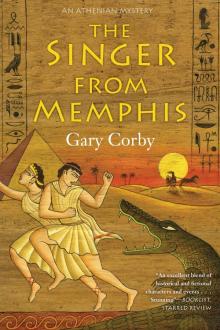 The Singer from Memphis
The Singer from Memphis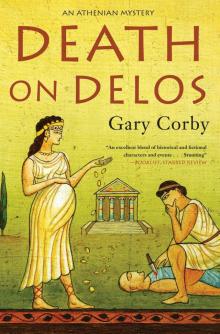 Death on Delos
Death on Delos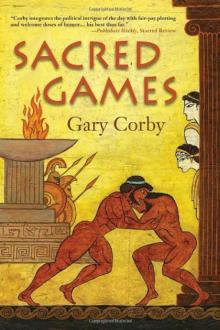 Sacred Games
Sacred Games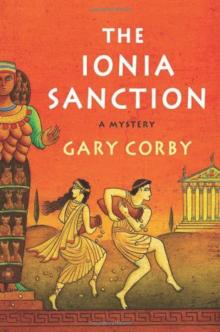 The Ionia Sanction
The Ionia Sanction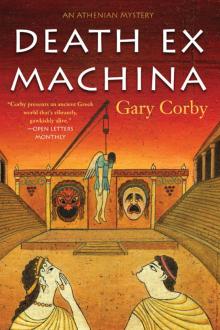 Death Ex Machina
Death Ex Machina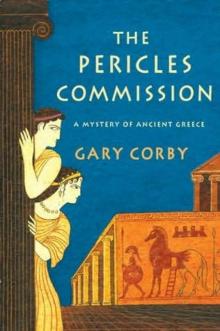 The Pericles Commission
The Pericles Commission